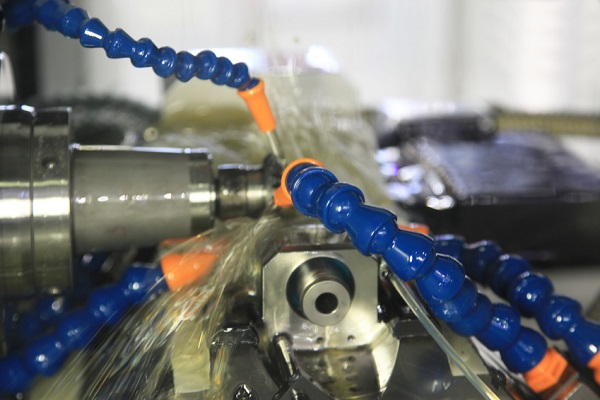Invista recently announced plans to close its Victoria, Texas, plant on March 31. At that site the company manufactures C12 intermediates, which include Corfree M1, a corrosion inhibitor that is widely used in metalworking fluids.
Longtime distributor Sigma-Aldrich has discontinued selling samples of Corfree M1, and states that no substitute or replacement is available. Invista has not responded to specific questions from Lube Report about plans to sell Corfree M1 after they close their Victoria, Texas plant on March 31.

Photo: popov48 / Fotolia
The closing of Invista’s plant affects production of C12 intermediates including Corfree M1, a corrosion inhibitor widely used in metalworking fluids.
In response to inquiries from Lube Report, Invista recently issued the following press release:
Invista announced in January its intent to exit the markets served by its C12 nylon specialty intermediates business, resulting in the permanent shutdown of the C12 manufacturing unit at its Victoria, Texas, site. It is anticipated that the operation of the C12 asset at Victoria will cease on March 31, 2016. Invista is committed to customer service and will continue to work with customers throughout the transition.
As one of the worlds largest integrated producers of chemical intermediates, polymers and fibers for nylon, spandex and polyester, Invista remains firmly committed to the global nylon 6,6 marketplace and will continue to invest in areas where it can offer customers advantaged technologies and superior products. Nylon 6,6 is a type of polyamide commonly used in fiber applications such as carpeting and clothing.
The decision to close the Victoria plant affects production of Invistas C12 product line. The C12 intermediates are a family of molecules that contain 12 carbon atoms. For example, dodecanedioic acid is a dicarboxylic acid or diacid, a short hydrocarbon chain capped with carboxylic acid groups. Corfree M1 is a blend of dodecanedioic acid, undecanedioic acid and sebacic acid.
Consultant Jerry Byers, former manager of research and development at Cimcool, was very disappointed to learn that Invista may discontinue sales of Corfree M1. He explained, I first began to work with Corfree M1 in the mid-1980s as an alternative to sodium nitrite. It proved to be an excellent rust inhibitor for cast iron and steel, at relatively low cost. This excellent rust control could be seen in the cast iron chip corrosion test.
Byers noted that Corfree M1 provides additional advantages: The chain lengths of the molecules are short enough to avoid foaming. Corfree M1 is fairly stable in hard water and is even compatible with cationic settling agents. It is really quite a unique material that can be used in synthetic, semisynthetic and soluble oils.
He concluded, Corfree M1 is a key raw material, and some additive suppliers neutralize it to form various amine salts. Some of these amine salts are superior to amine borate rust inhibitors in terms of residue formation on parts. The removal of Corfree M1 from the market would be a great loss for the metalworking fluid industry.
Karen Eisenhauer, industry specialist at Integrilube, reflected on her experience formulating Corfree M1 in metalworking fluids. She recalled, Corfree M1 is really a unique additive for water-based metalworking fluids. The best additive chemistries provide the formulator with synergies that enhance performance and fluid life. Corfree M1 assists in corrosion inhibition and antistaining properties. Mixtures of Corfree M1 with other additives provide exceptional lubricity stability and tool life. Corfree M1 is unlike any other additive that I have tested.
Eisenhauer expects that it would be a challenge to replace Corfree M1. To date, she has not seen an additive that provided corrosion inhibition, biostability, lubricity stability over time and overall fluid stability comparable to Corfree in most water-based formulations.
She cautioned, There is not a single laboratory test that mimics six to eight weeks of service in a recirculating metalworking fluid application. It will be necessary to see how a new formulation will perform in a CNC (computer numerical control) router and judge tool life, tooling compatibility under stress and heats of friction as well as corrosion inhibition. An extended field test program will be necessary to see if alternatives compare with Corfree M1. Maybe six to eight months from now, we will learn whether the market has found an adequate substitute for M1.
Richard Butler, technical manager at Chemtool in Rockton, Illinois, commented that Chemtool has experience dealing with periodic shortages of Corfree diacids. Chemtool has tested alternatives to Corfree M1 for this reason. Butler added, Some alternatives to M1 are lower cost, and this may have contributed to Invistas decision.
If Corfree M1 is no longer available from Invista, Butler feels confident that metalworking fluid formulators will persevere and develop new formulations with other corrosion inhibitors.